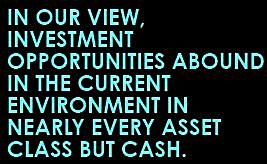David Nelson is the chairman of the Investment Policy Committee and portfolio manager at Legg Mason Capital Management.

Article republished from Smart Investor with permission.
INVESTOR BEHAVIOUR (now) is consistent with their behavior at prior important lows. Investors as a group are, unfortunately, their own worst enemies when it comes to making money in the market.
They can be reliably predicted to throw money at the market after it has gone up, as they did by pouring US$260 billion into US-focused Equity Mutual Funds in 2000.
Equally predictable, they were massive net sellers of domestic equity funds in 2008, withdrawing US$168 billion, most of it in the fourth quarter after nearly all the damage had been done to stock prices for the year.
What investors want most dearly now is cash, and they have piled up US$3.8 trillion of it in money market funds. This cash hoard is now equal to a record 37.7 per cent of the total market value of US common stocks.
Investors seem content to hold cash for now, but as the yield on money funds drops meaningfully below one per cent, and especially if stocks and bonds continue to rally, investors’ views on the desirability of holding cash will likely change.
A final thing we find encouraging about the current market environment is that the long-term returns on stocks have historically been powerfully mean-reverting.
Periods of above average returns are followed by periods of below average returns which, in turn, give way to renewed periods of above average returns. The mid-teens returns of the 1980s and 1990s have been followed in the new millennium by a period of distinctly sub-par returns.

Quote by David Nelson
Since the beginning of 2000, the nine-year return of the S&P 500 Index has been -28.13 per cent (or -3.60 per cent compounded).
Measured to the November 20, 2008 low, the 10-year annualised total return of the S&P 500 is -2.66 per cent, a cumulative loss of -23.59 per cent over that period, according to calculations from Steve Leuthold.
The total return loss for that 10-year period matches the worst 10-year performance in US stock market history, from 1929 to 1939.
That’s bad news looking backwards, but quite likely to be good news looking forward, because, according to Leuthold, since 1926, when trailing 10-year compound annual returns have been one per cent or less, subsequent 10-year compounded annual returns have averaged 10.7 per cent, in a range of 7.2 to 15.6 per cent.
The extremes we have all endured in 2008 have created an enormous degree of stress among investors. Under stress, human beings react fairly predictably.
Their time horizons shorten dramatically and their decision-making processes tend to be driven by their limbic system (or lower-brain function) which reacts instinctively and emotionally.
’Don’t hide under the bed’
Longer-term plans and rational thought go out the window and avoidance of pain becomes the dominant objective.
Investment decisions made in this state are often emotionally satisfying in the short-term, but often financially injurious in the long-run.
Because the news flow over the next couple of quarters is likely to be pretty grim, it will not be easy for investors to fight the all-too-human tendency to seek the safety and security of cash, the financial equivalent of hiding under the bed. We urge investors to fight this tendency.
In our view, investment opportunities abound in the current environment in nearly every asset class but cash. Waiting for the economic all-clear signal could therefore prove quite expensive, in our judgment, in terms of lost opportunity.
In other words, the opportunity cost of holding cash is currently “extremely” high in our view, while the financial rewards for holding it are fast approaching zero.

